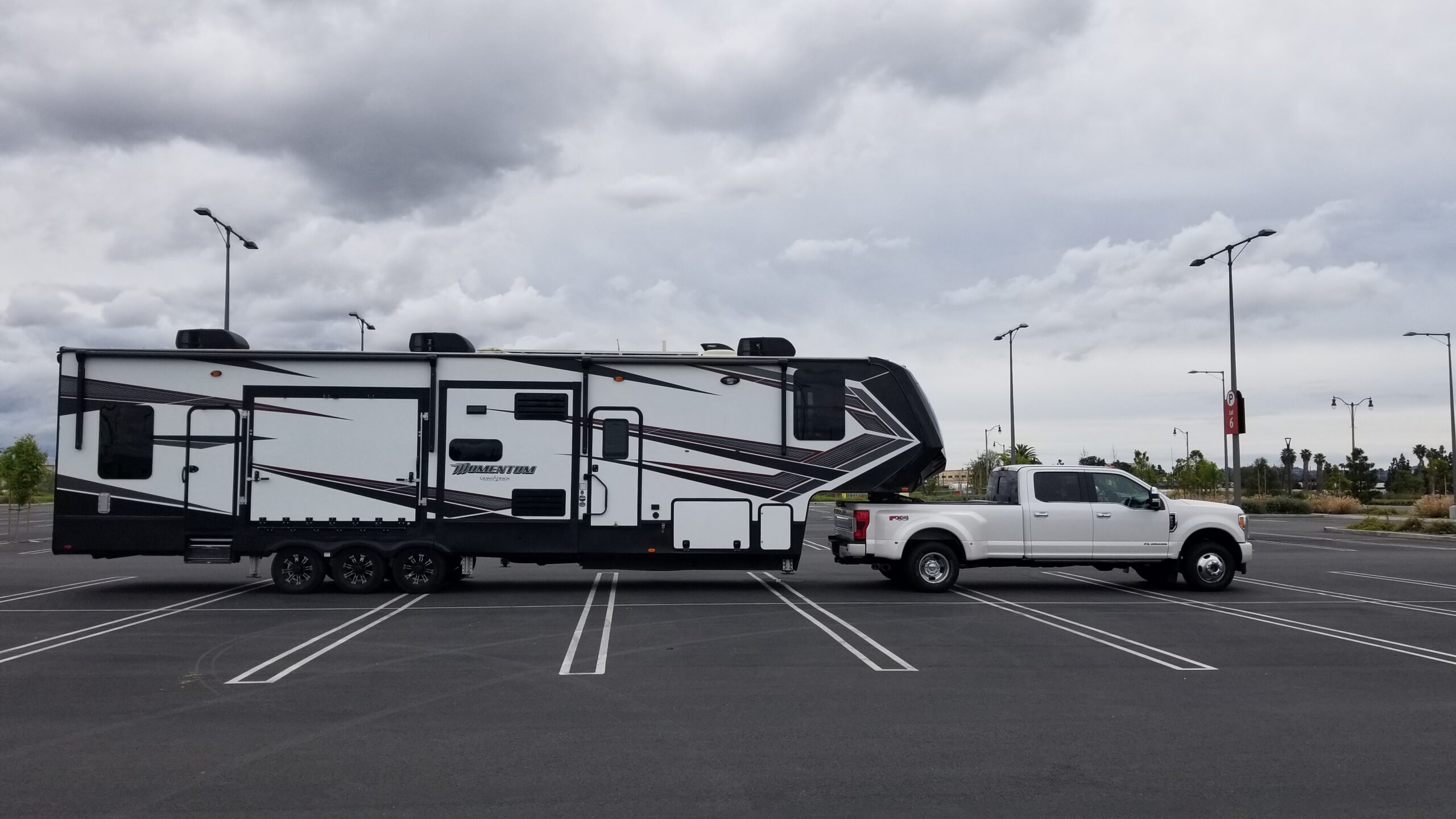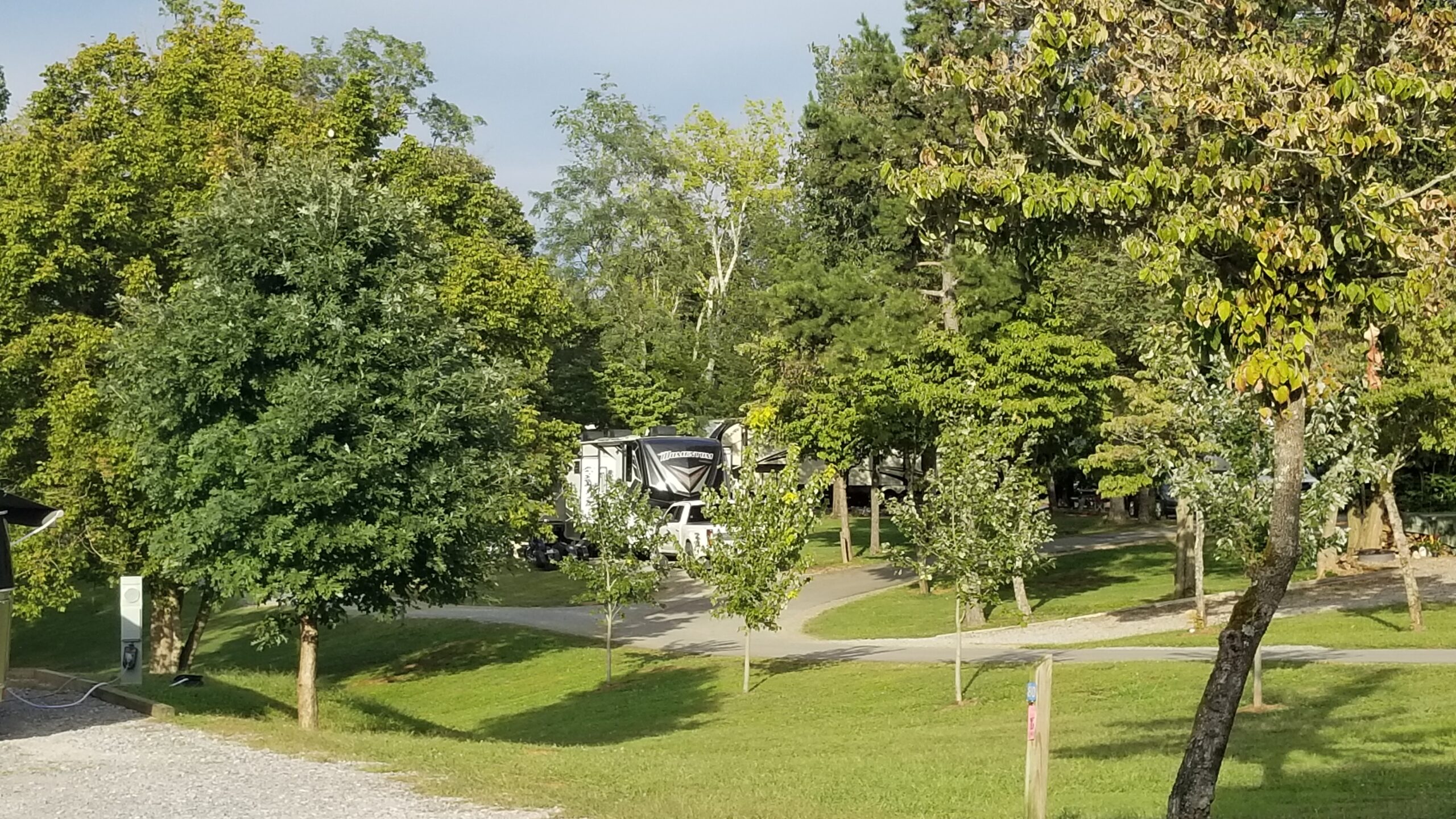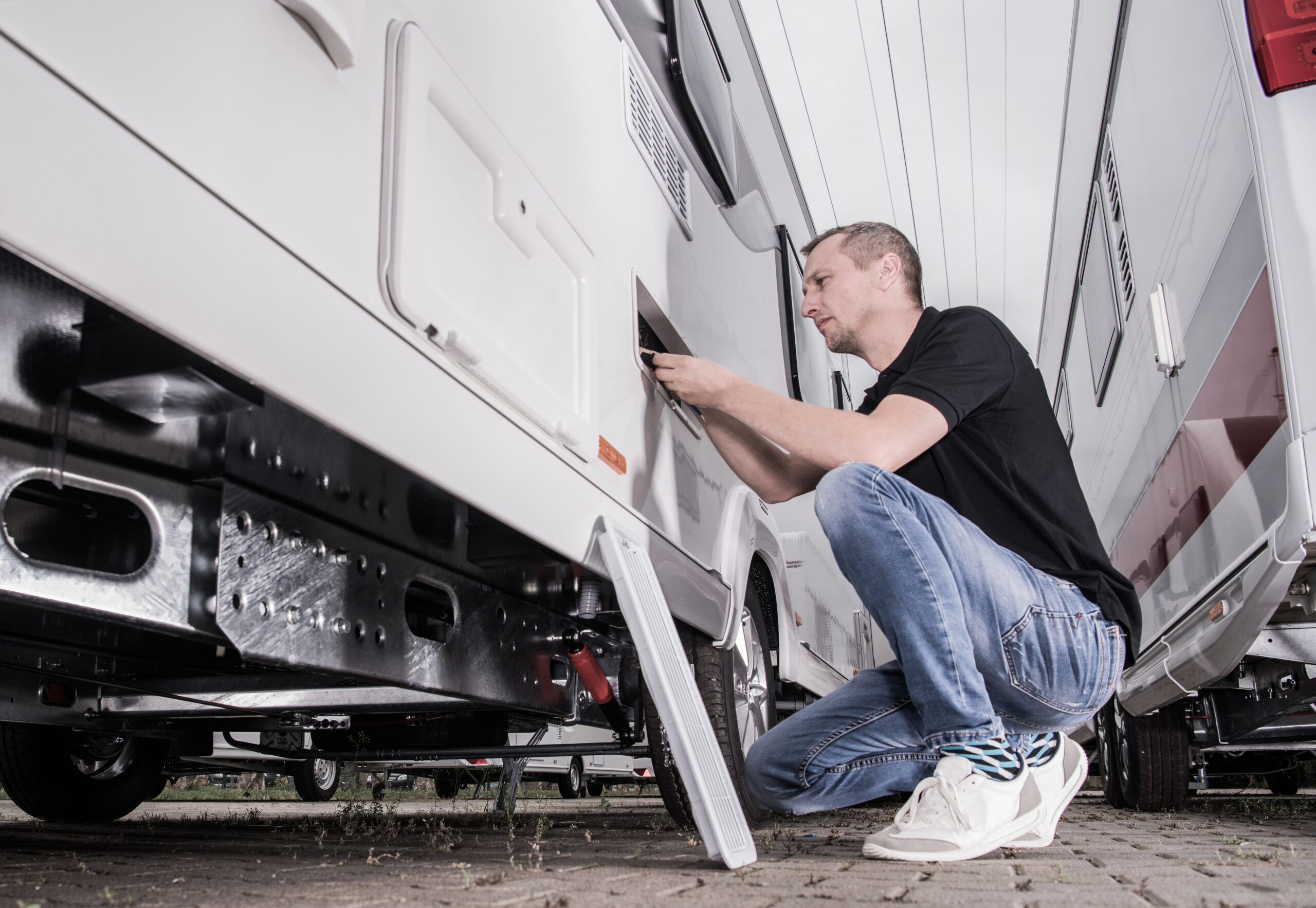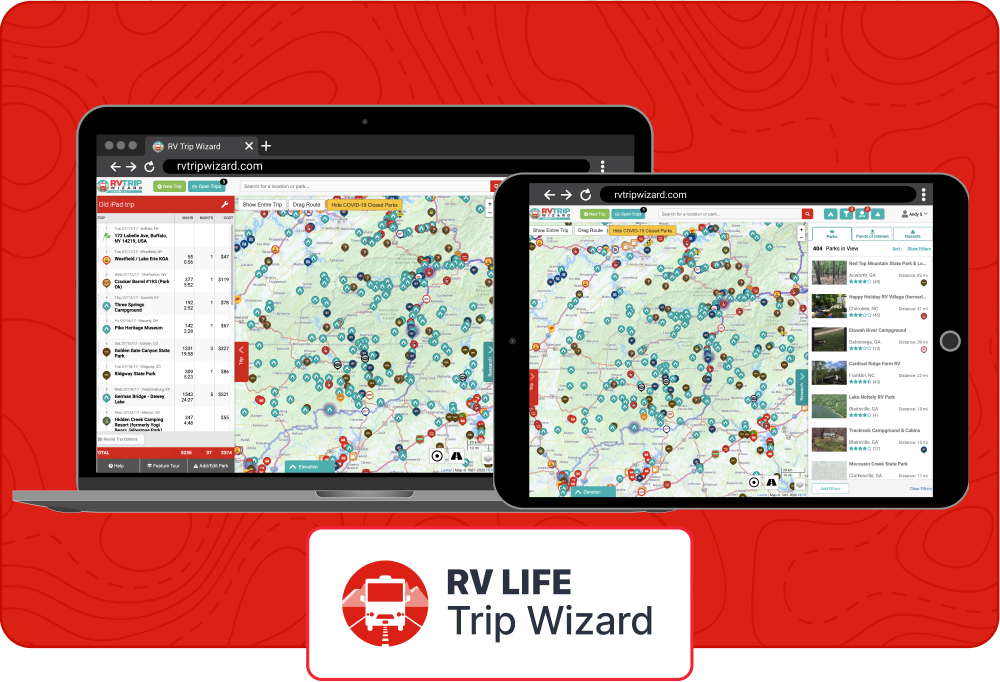
Practicing with the new RV in a large parking lot will help you avoid many RV mistakes.
Avoid Making These RV Mistakes As A Newbie
Everyone starts out as a new RV owner. No one is born an expert. RVing is absolutely achievable, but there are some preventable RV mistakes you can avoid before getting into the lifestyle.
Mistake #1: Not having a checklist
There are many steps in setting up your RV once parked, as well as similar (but different) steps to get back out on the road.
Many RV social media groups offer checklists that you can utilize. These are good starting points, but every RV is different, and every lifestyle is different. Perhaps you are a solo traveler or maybe you have a cohort with you to assist. Determining all the things that need to be completed before takeoff is key so you don’t make a costly mistake.
Are the antennas down? Did you get your surge protector from the power box? Did you ensure the landing jacks are fully retracted? Build and refine your checklist until you are confident in your setup and teardown to ensure your financial and physical safety.
Mistake #2: Too much haste
Slow down! This applies to many areas of RVing. Your tires will have less heat accumulation at slower speeds and your fuel mileage will thank you.
There simply is no place you need to get to in that much of a hurry. This relates to more than just speed. When you are ready to leave the campground, take your time. Let everyone in the group walk around the rig, looking for forgotten tools, toys, and connectors. As the driver, ultimately it is your responsibility for the safety of your rig and your passengers.
We can always be more aware if we are patient and thorough. According to Larry Macdonald, author of RV Oopsies: 101 Dumb Things RVers Do, a recurring theme of RV mistakes is a lack of patience.
A further exploration of the slow down concept is about your length of stay in a particular location. In our case, as fulltimers, we usually stay at a campground for about a month. Not only does this get us a discount (though sometimes we have to pay for electricity), it also means far less diesel fuel used pulling the rig. It allows us to really get to know an area and maybe visit that great restaurant again. It also means we can skip something we wanted to do and wait for another day when it isn’t raining.
Mistake #3: Jumping on the road with no practice
When you first take possession of your new rig, practice is a must. Driving Class A and Class C motorhomes and towing a fifth wheel are all different, and they are very different from your regular vehicle.
Take your rig to a large, empty parking lot. Set out cones, and practice turning, stopping, and backing up. Practice hooking up your toad or hitching the fifth wheel, as appropriate for your rig. If any RV mistakes will be made, make them where you don’t impact other drivers and you’re in no rush.
When we bought our fifth wheel, we flew from Dallas to LAX, acquiring the F-350 dually and rig directly from the owners. After the sellers spent a gracious three hours going over everything (and us taking notes), they gave us the advice, “Spend an hour here in this giant parking lot, practicing.” It was excellent advice, and after we hit a curb or two, we learned to turn wider before getting out on the Los Angeles freeways back to Texas.
That practice, too, should include knowing how to hook up your water source, hooking up your power, and hooking up your sewer hoses. Also test your equipment before leaving home, know how to turn the fridge on and off, how to change your propane tanks, and how to empty holding tanks.
Do the heaters or air conditioners work? Don’t wait until you arrive at the campground to find that you are missing a critical piece of equipment or know-how.
Mistake #4: Not planning your route
There are wonderful tools available, such as RV LIFE Pro, that allow you to map your origin to your destination. These tools allow you to put in your rig’s height and weight to ensure that you don’t scrape the air conditioners and antennas off your rig or risk driving over bridges that are not rated for your weight.
If you are driving a Class B van, you’re likely not going to have any issues, but for the rest of us, height and weight matter! Part of this mistake is not even knowing the height and weight of your RV. Learn these numbers!
If you plan to drive in Canada, know these numbers in meters and kilograms as well. It has been often suggested to put them on a sticky note inside your windshield to ensure the data is always available to you at a glance.
In addition, we use the street view to get an idea of what a campground’s entrance area looks like. We also use the satellite view combined with a campground map to view our assigned spot when we have one.
This was a good idea for the campground we’re currently at, as we needed to move into the middle lane as we approached to turn our very long fifth wheel into close quarters. Not researching ahead of time would’ve meant needing to back up into traffic to try again—not something anyone wants to do on a busy street.
Planning your route also means planning your fuel stops. The larger your RV, the more planning ahead will help you. Sure, the diesel is a lower price here, but will you fit? Can you maneuver around the lot, the pumps, and other drivers? RV LIFE Trip Wizard will help you find fuel stops along your RV-safe route.
Mistake #5: Not calling ahead or not asking the right questions
Did you know that some campgrounds don’t allow pets or certain breeds? Did you know that others don’t accept mail? Are motorcycles or golf carts allowed?
For as many campgrounds exist, there are as many combinations of rules possible too. Always ask for an email of the rules when reserving if isn’t available on the website. Ask if there are specific things you need to know. You may also want to ask if they have any suggestions on things that are must-do in the area.
Mistake #6: Choosing the wrong tow vehicle
To start, never trust a truck or RV seller. They may be right, but always do your own research on the numbers. If the dealer tells you, “Sure, you can pull this 44-foot, 20,000-pound fifth wheel with your F-150”, you’ll understand why this is important.
Our budgets are all different, but ensuring you have the right vehicle with the right capabilities to tow your rig will reduce accident potential, vehicle breakdown, and increase overall safety and peace of mind.
While it is better to “go big or go home”, having a vehicle that is too large will result in wasted fuel and higher maintenance costs. Check the manufacturer specs on your tow vehicle to ensure you understand bumper pull and pin weights. It can be daunting but it’s worth the time you invest to become an expert.
If you’re planning to pull a vehicle with your Class A or Class C motorhome, understand what allowed weights are for your rig. Also, know the toad. Can it be flat towed? How do you disengage the transmission? Do you require a two dolly? How will this impact parking in the types of campgrounds you plan to visit?
If you plan on pulling a trailer, did you know that in some states, it’s illegal to have a truck pulling a fifth wheel pulling a trailer? In some cases, it’s illegal to do any triple towing, but in others, it’s the total length of the combined units.
Mistake#7: Not getting the right insurance policy
There are many potential RV mistakes in this category, but they all revolve around over-insuring and under-insuring. If your RV is financed, there may be specific coverage values and types that are required.
Different insurance companies may cover things differently. With our policy, we had to obtain a separate insurance rider for the roof! Some insurance companies will not cover fulltiming in your rig. If you are not a fulltimer, where you store your rig when not in use may be an important factor.
Over-insuring your rig can cost you in the long run, too. Paying for coverages that don’t apply to your specific RV setup or your lifestyle means you’ll pay extra costs that you don’t need to pay. Talk with an experienced, trusted insurance agent about your rig type and your planned usage. You can start with policy shopping from an online provider like RVerInsurance.com. RVer Insurance Exchange offers free quotes for RV Insurance, Health Insurance, even Extended Warranties.
Mistake #8: Allowing people to tell you how to park your rig (if you don’t want the help)
After time, you will develop a system for getting your rig parked. If you have a traveling companion to act as a spotter, this is a good thing. Backing into a spot and having to turn the steering wheel will always put one side of the rig out of view. We use inexpensive walkie-talkies to ensure that the spotter can communicate quickly with the driver.
If you’re struggling with your back-in spot (and you will if your rig is large and you are new), neighbors or staff will like to help you. This is important to remember: you are responsible for the safety of your rig. If that helpful neighbor allows you to back into a tree, they aren’t going to cover the costs of the damage.
It can be difficult as a new RV owner to be firm, but you should absolutely let them know you have a system. If you can utilize the helper in a way you feel comfortable with, that’s fine, but take control of your decisions.

Use your own system for parking your rig, even in tight spots
Mistake #9: Getting interrupted (or doing the interrupting)
This is where the checklist can definitely come in handy. I can’t tell you how many times we have been interrupted trying to pack up the rig, or more frequently, upon arrival. Being able to go back to your checklist to see what you hadn’t finished is key!
When your new neighbor arrives, you may be interested in something they have, but give them time to complete their setup before trying to ask them about it. Wait until they are sitting outside in their chairs having a cocktail. You’ll save them potentially costly RV mistakes by allowing them time to get through their own checklists!
In reference to the helpful staff mentioned above, we had a camp host and his wife both help and interrupt us at the same time. The wife was trying to talk to the spotter and the husband was trying to direct the driver. Finally, we had to be polite but firm that we had the walkies and we had done this many times; let’s chat after we get set up.
Mistake #10: Not keeping up with maintenance and recalls
If you want your rig and vehicles to last longer, don’t skip the maintenance. A little graphite in the locks, regular oil changes, checking the torque on the lug nuts, inspecting the suspension, repacking bearings–all these things go a long way to ensure your safety and the longevity of your home on wheels.
Both your RV and vehicle owner’s manuals should contain lists of suggested maintenance items. Some of these you can do yourself, others will require a planned trip to the dealer or engaging a mobile RV tech.
We’ll admit, we may not wash the rig as often as we’d like, but we do remember to use manufacturer-approved lubrication on the slides and seals, check our rig and tow vehicle air pressure before every trip, and stay registered with the manufacturers for recall notices.
RVs are assembled hastily, and every year the design specs change. They make mistakes, too. Making sure you can receive the recall notices is important. You can look up recalls for both your RV and tow vehicle here: https://www.nhtsa.gov/vehicle/.

Keep up with your RV maintenance to increase the rigs longevity
“An ounce of prevention is worth a pound of cure” is a cliché for a reason: it’s true. Make sure you keep track of all your RV maintenance and repairs with an online tool such as RV LIFE Maintenance. Not only can you keep all of your documents in one place, but you’ll also receive timely reminders when maintenance is due to help you avoid costly repairs and potentially serious accidents.
Mistake #11: Not having the right memberships
There are so many great memberships to have, but not all are appropriate for all RVers. Early on in our RVing lifestyle, we found that we purchased a couple of memberships we didn’t use because they didn’t fit our lifestyle. Having a large rig means skipping the national parks, so a membership that gives us a discount for those is not a good investment. On the other hand, an investment in a membership that lets us stop for the night at wineries–that was money well spent for us.
Memberships can also include roadside assistance packages. Do your research to understand what the coverages are. Having more than one can be beneficial, but it could also be a waste of money if the coverages are close to identical.
Many of these packages may use the same underlying contract companies. If one isn’t available in your breakdown area, it might not matter which company you contract with.
Mistake #12: Not having the right supplies (or too many supplies)
As fulltimers who sold our home, our first instinct was to get all the things we might ever need. Fortunately, we communicated a lot before moving into the rig. While there are certainly some items you will always use (sewer hoses, etc.), some items can be purchased as needed from a local hardware store (which very often have RV supplies) or the nearest big box store.
When we hit the road, part of our minds were filled with “we’ll be in the wilderness, forever!”, yet the reality was that we are usually not far from town, as we need to have internet access for working on the road. In fact, we rarely have a full fresh water tank!
Every six months or a year, go through all your supplies. When we visit family for the holidays, we go through everything and decide if it can stay or if it must go. This includes clothing, tools, kitchen items, etc. Reducing your rig’s weight is always a good idea.
Mistake #13: Not doing enough research
Once we decided to go fulltime, we spent the next three months reading every blog and watching every YouTube video we could find. Much of the content was redundant but each had a slightly different take on things.
We learned by video that we would be replacing the mattress, why bridge heights are important to know, and about solar power and lithium batteries. We discovered so many things that are beyond the scope of this article but can benefit everyone. Learn from everyone else’s mistakes: it’s cheaper!
We see so many questions posted online and wonder “did they even do a web search before asking?” because there is so much content out there. Here on RV LIFE, we have a wide variety of articles and tools that are valuable to your RVing experience. There are Facebook groups, online forums (and forums for specific manufacturers, even specific models), newsletters, and more.
Utilize these resources. Compile a list of your favorites and bookmark them. Subscribe to (and get notified by) your favorite YouTube channels. We regularly visit about 10 great channels that are full of factual, useful information.
Mistake #14: For full-timers, you’re not on vacation
We wanted to list this mistake because we felt like it was the most important piece of advice we came across. In our case, we aren’t retired. We’re still working, albeit at a slower pace than before, and the budget matters. We can’t visit every awesome thing in every location without blowing our funds.
If you have unlimited funds, congratulations. For the rest of us, we still have to buy groceries, fill up the diesel, pay for campsites, and occasionally pay for the unexpected repair or medical needs.
Learn more from the RV community
One of the best parts about RVing is engaging with the community of traveling enthusiasts. iRV2 forums allow folks to chat with other RVers online, and get other perspectives on everything RVing, including products, destinations, RV mods, and more.
Related articles:
- Why Wait To Go RVing In Retirement? 8 Reasons To Hit The Road Now
- 6 Tips Of Travel Trailer Advice For Newbies
The post The 14 Worst RV Mistakes You Can Make As A Beginner appeared first on RV LIFE.

